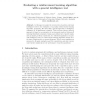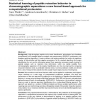357 search results - page 8 / 72 » New Insights into Learning Algorithms and Datasets |
131
Voted
CAEPIA
2011
Springer
14 years 1 months ago
2011
Springer
In this paper we apply the recent notion of anytime universal intelligence tests to the evaluation of a popular reinforcement learning algorithm, Q-learning. We show that a general...
124
Voted
ICML
2009
IEEE
16 years 2 months ago
2009
IEEE
Sparse coding--that is, modelling data vectors as sparse linear combinations of basis elements--is widely used in machine learning, neuroscience, signal processing, and statistics...
135
Voted
BMCBI
2006
15 years 1 months ago
2006
Background: Many different aspects of cellular signalling, trafficking and targeting mechanisms are mediated by interactions between proteins and peptides. Representative examples...
136
Voted
BMCBI
2007
15 years 1 months ago
2007
Background: High-throughput peptide and protein identification technologies have benefited tremendously from strategies based on tandem mass spectrometry (MS/MS) in combination wi...
101
click to vote
EVOW
2010
Springer
15 years 5 months ago
2010
Springer
A challenging problem in bioinformatics is the detection of residues that account for protein function specificity, not only in order to gain deeper insight in the nature of functi...


